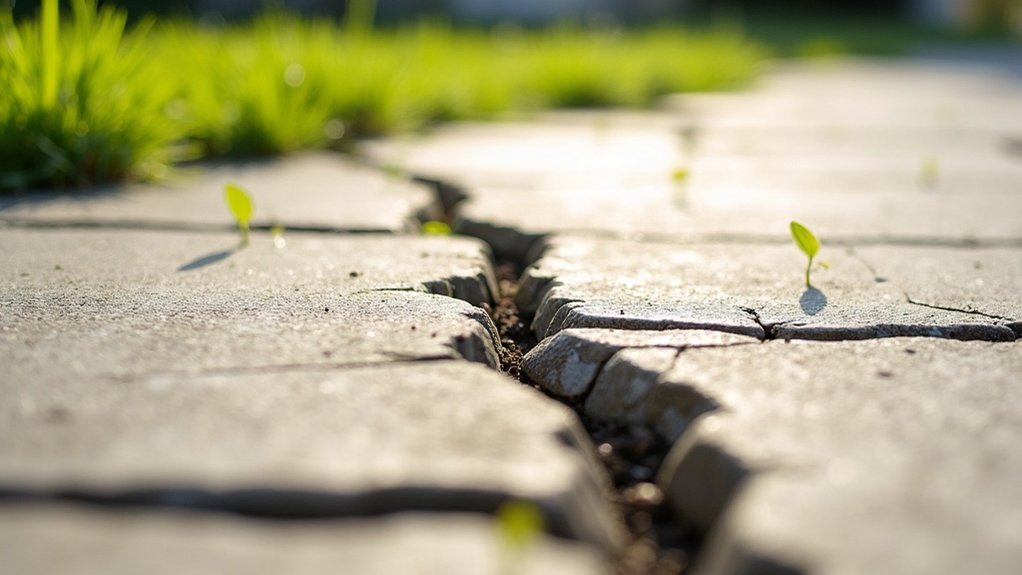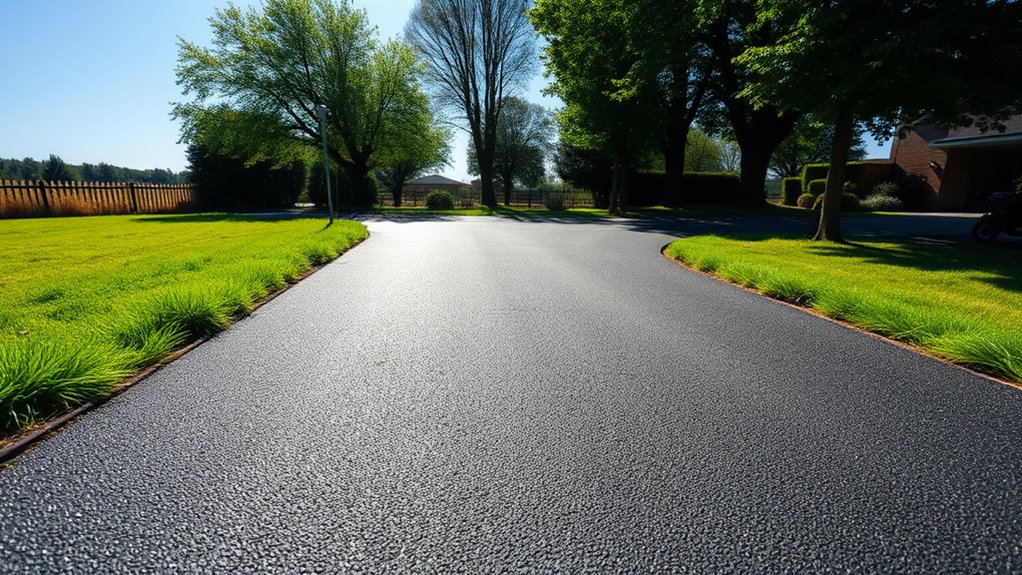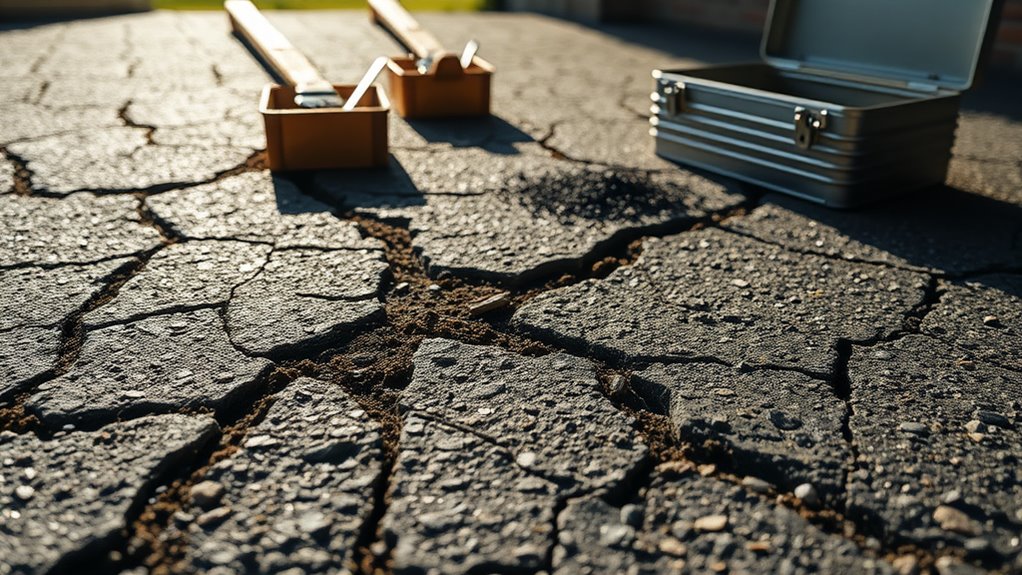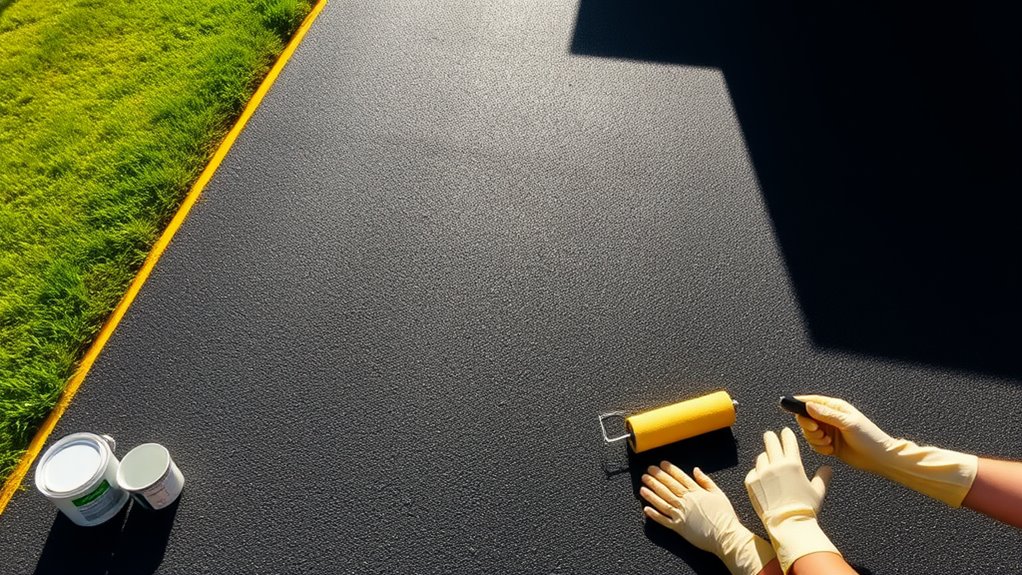Concrete driveways can crack for a number of reasons. Weather-related issues, such as freeze-thaw cycles and inadequate drainage, can compromise the material’s integrity. Soil movement, particularly in clay or sandy areas, may lead to instability beneath the driveway. Mistakes during installation and curing, like improper mixing or not allowing enough time for hardening, also contribute to cracking. Furthermore, heavy loads and chemical reactions from de-icing products can cause damage. Understanding these factors can help with both prevention and repair.
Table of Contents
ToggleKey Takeaways
What Causes Concrete Driveways to Crack?
- Freeze-thaw cycles can allow water to seep into the concrete; when it freezes, it expands, leading to cracks.
- Soil movement, particularly in clay or expansive soils, can place stress on driveways, resulting in uneven settling.
- Poor installation practices, like improper mixing or insufficient curing, can weaken the concrete and make it more prone to cracking.
- Mechanical stress from heavy vehicles or inadequate soil compaction can cause visible cracks over time.
- Chemical reactions, such as alkali-silica reactions, along with the use of de-icing agents, can further weaken the concrete and lead to cracking.
Weather-Related Causes
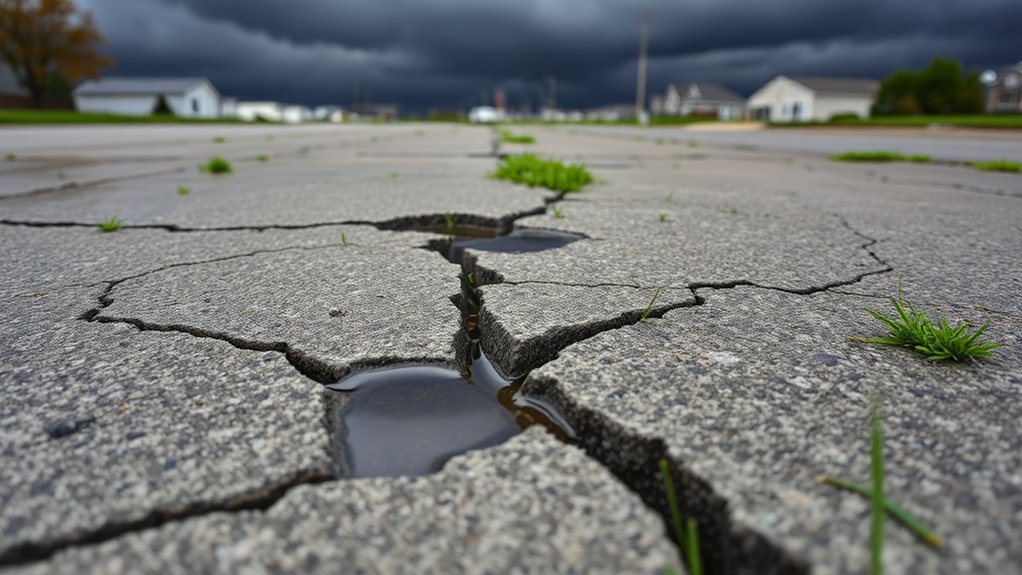
Weather-related issues significantly impact the deterioration of cracked concrete driveways. Freeze-thaw cycles are particularly harmful; water seeps into the pores of the concrete, freezes, and expands, which can widen existing cracks or create new ones. This process accelerates damage, especially in colder regions, leading to spalling and surface flaking. Moreover, poor drainage systems can exacerbate these issues by allowing water to accumulate, further weakening the concrete.
Thermal expansion and contraction also contribute to cracking, as concrete expands in heat and contracts in the cold. Rapid temperature changes can increase this risk, particularly if proper expansion joints aren’t in place.
These weather-related factors highlight the importance of preventive sealing. By sealing cracks, you can reduce water infiltration and lessen the effects of freeze-thaw cycles and thermal stress on your driveway.
Soil and Subgrade Movement
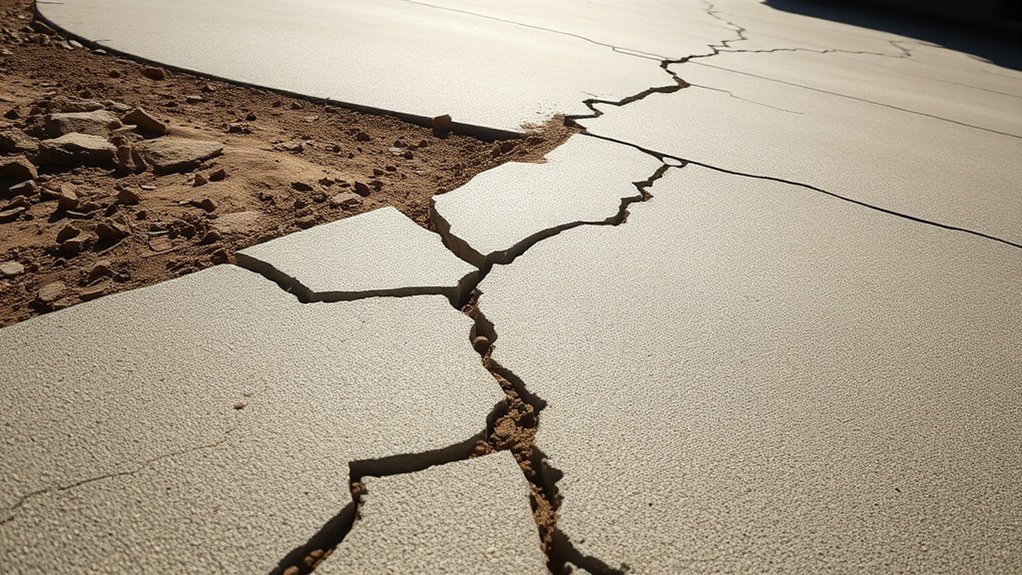
Soil and subgrade movement is crucial for the stability of concrete driveways. Different soil types and moisture levels can lead to serious structural problems.
For instance, clay soil expands when wet and contracts when dry, putting stress on your driveway. Sandy soil, which often lacks proper compaction, shifts easily, causing uneven settling. Expansive soils can swell significantly, lifting slabs and creating cracks. Additionally, weak or shifting soil can exacerbate these issues, leading to increased vulnerability for your driveway.
Additionally, erosion from issues like water pooling or poor drainage can wash away the soil beneath the driveway, leading to voids that reduce support. If the soil isn’t compacted properly during installation, these problems can worsen over time, resulting in further settling.
Understanding these soil types and their behaviours is essential for preventing cracking and ensuring a durable, stable driveway surface.
Installation and Curing Issues
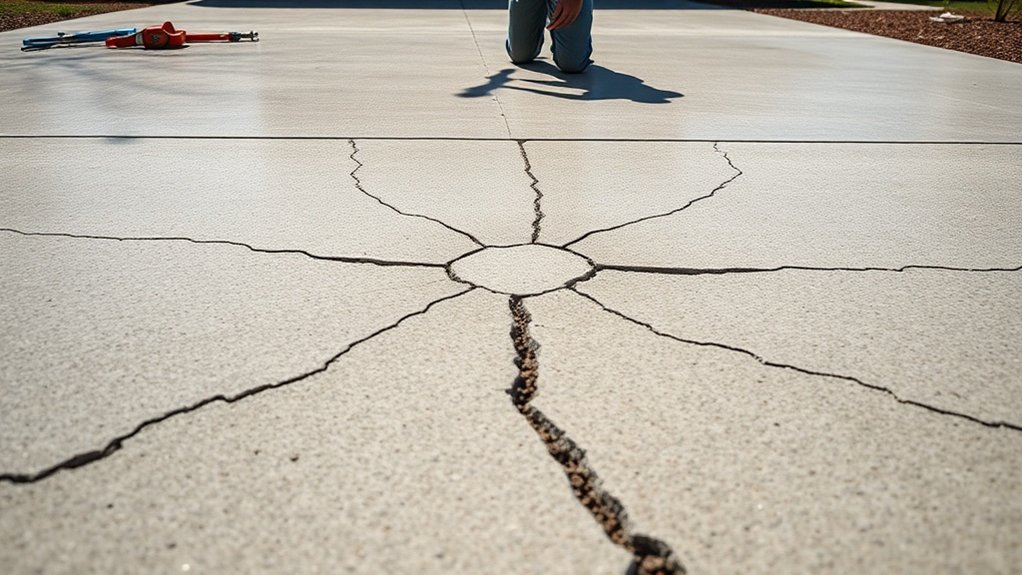
Proper installation and curing of your concrete driveway are essential. Skipping these steps can lead to serious problems.
For instance, mixing errors like an incorrect water-to-cement ratio or using subpar aggregates can create a weak concrete mix, making it more susceptible to cracking and surface issues. Moreover, not allowing enough curing time can prevent the concrete from reaching its intended strength, increasing its porosity and making it vulnerable to freeze-thaw damage. Rapid drying conditions or incorrect curing methods can also result in surface defects such as dusting and crazing. If you overlook these factors, you’re likely to encounter significant cracking in your driveway over time. Quality installation ensures resistance to elements and vehicle traffic, further reducing the likelihood of cracks developing.
Mechanical and Structural Stresses
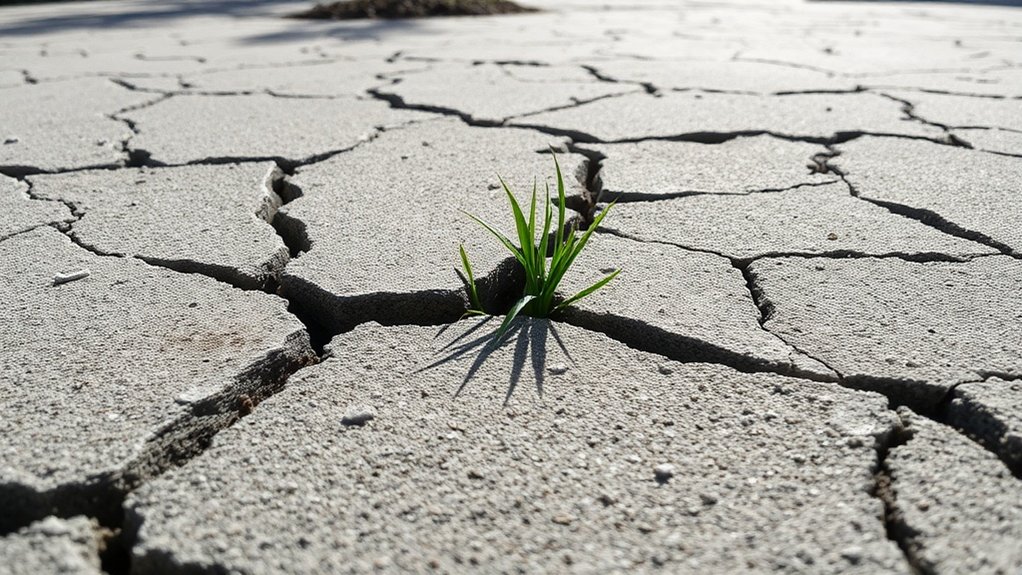
Understanding mechanical and structural stresses is vital for preserving the integrity of your concrete driveway, as these forces can cause significant cracking if not managed properly.
Concrete experiences tensile stress when loads surpass its tensile strength, a problem often worsened by inadequate reinforcement. Repeated heavy loads can lead to microcracks merging into visible cracks.
Furthermore, poorly compacted soil beneath the slab can create compressive stress from settling, while tree roots or soil heaving can exert upward pressure.
Thermal expansion and contraction also add to these stresses, particularly when control joints are lacking.
Ultimately, insufficient structural design and construction practices can heighten these issues, increasing the likelihood of cracking in your driveway.
Chemical and Environmental Effects
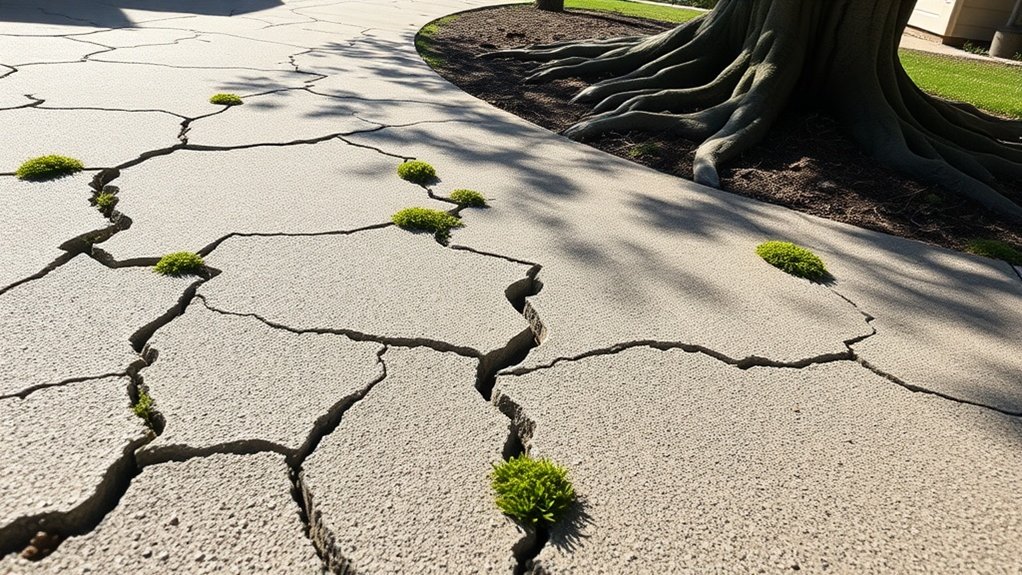
Chemical and environmental effects significantly contribute to the deterioration of concrete driveways, often resulting in cracks and structural failure. Understanding these factors can help you minimise risks:
- The alkali-silica reaction (ASR) generates expansive gels that create internal pressure.
- Freeze-thaw cycles worsen existing cracks, compromising the integrity of the concrete.
- De-icing chemicals interact with concrete, forming expansive compounds that cause further damage.
- Poor drainage leads to increased moisture retention, heightening chemical reactions.
When moisture seeps into the porous surface and freezes, it expands, resulting in cracks. Repeated freeze-thaw cycles intensify this damage, and harmful chemicals accelerate deterioration.
To maintain your driveway’s longevity, it’s vital to address these issues promptly using suitable sealants and additives.
Frequently Asked Questions
How Can I Prevent Cracks in My New Concrete Driveway?
To prevent cracks in your new concrete driveway, ensure proper curing by keeping the surface consistently moist, particularly during temperature changes. Incorporate control joints and reinforcement to help manage stress and maintain the slab’s integrity effectively. For instance, adding steel mesh or rebar can provide added strength, while control joints allow for natural expansion and contraction.
What Is the Best Time to Install a Concrete Driveway?
Timing is crucial! The best time to install your concrete driveway in the UK is autumn, when the mild temperatures promote optimal curing. To boost durability and reduce the chance of cracking, keep these installation tips in mind.
Should I Seal My Concrete Driveway, and Why?
Yes, you should seal your concrete driveway. Various types of sealants can enhance durability, protect against moisture and chemical damage, and improve the overall appearance. Sealing your driveway can extend its lifespan and lower maintenance costs, helping to keep it in top condition for years to come. For instance, if you live in an area with harsh winters, sealing can prevent water from seeping into cracks and freezing, which can cause further damage.
How Often Should I Maintain or Repair My Concrete Driveway?
Consider your driveway like a well-kept garden; it thrives on regular care. Aim to clean it once or twice a year, and address any small cracks as soon as they appear to ensure its longevity and strength.
Can I Patch Cracks in My Concrete Driveway Myself?
Yes, you can repair cracks in your concrete driveway yourself. Using flexible sealants, backer rods, and proper cleaning methods ensures effective DIY repairs. This helps keep your driveway in good condition and prevents further damage.
Conclusion
In summary, understanding what causes cracks in concrete driveways is crucial for maintaining their durability. It’s interesting to note that nearly 90% of concrete cracks result from poor installation or environmental factors. Issues like weather changes, soil movement, and inadequate installation can significantly increase the risk of cracking. Regular maintenance and monitoring can help extend your driveway’s lifespan, keeping it both functional and visually appealing for years to come.
Maximize the durability of your tarmac driveway by understanding the ideal weather conditions for installation—discover the secrets to perfect timing Read more
Discover the common causes of tarmac driveway cracks and learn effective repair methods to protect your investment—your driveway deserves the Read more
Before you paint your tarmac driveway, discover essential tips and techniques that can transform its appearance and durability—don't miss out Read more

